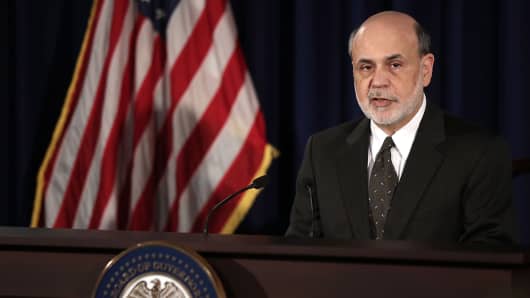I believe the Treasury market in the last weeks weeks scared Ben Bernanke to death. All the efforts he has made to stimulate the economy and create wealth were coming undone right before his very eyes because of a few words spoken about the eventual unwind of quantitative easing. And he was not about to let that happen.
On Wednesday, the Fed Chairman said in no uncertain words that quantitative easing was here to stay because of a low inflation rate as well as a high unemployment rate that he said "understates the weakness in the labor market". Did anyone hear that part of the sentence? That's the part that matters as it underscores his concern that the current economic recovery in the United States is far weaker than many believe. We agree.
We continue to believe that quantitative easing is here to stay through the end of the year unless jobs numbers come in shockingly positive and the rise in oil prices kicks inflation to a higher number. That means the recent sell off in Treasurys, as well as the bludgeoning of income-related stocks (those that pay dividends), is probably overdone.
Quantitative easing will end one day and the bond market as an anticipatory creature will price in expectations of higher interest rates. But for now, it's our belief that it is an overreaction to say that interest rates are inevitably going to rise in the near future; I just don't see the economic evidence to support that argument.
As you listen to commentators and pundits debate this point, remember that timing is key. I do believe interest rates are destined to rise based on a quantitative easing implemented for too long and will result in a painful snapback that will negatively impact fixed income investors. The time is now to start adjusting portfolio strategies for that eventuality. But it's probably not the time for rash action now as we will likely see the 10-year Treasury yield fall from recent highs (if our view of a stumbling recovery is correct)
The Federal Reserve is casting its lot with a philosophy that the wealth effect will increase consumer sentiment and provides a tailwind for an economic recovery. It had better work and interest rates had better stay low for the millions of homeowners that are still underwater in their mortgages with adjustable rate loans. That's the big bet being made. And as usual, Federal Reserve officials are speaking to the market and consumers rather than merely setting policy; it's become a public relations game.
Once again we wrestle with the vocabulary used by Federal Reserve officials. And don't think for a second that experts have been able to decipher what is really meant when a certain preposition or adjective is used in a statement. It's anyone's guess; there continues to be debate and confusion. It's not unlike four golfers standing around a ball trying to figure out where to take a proper drop; that dazed and uninformed look is similar to economists and strategists trying to decipher the latest comments from the latest speech. Include me in this herd of experts; we try to decipher meaning but words and intentions are not always easily interpreted .
Rates are going up next year. Quantitative easing will be phased out at the earliest in the fourth quarter and, in all likelihood, the first quarter of of 2014. Furthermore, the next Federal Reserve Chairman will be left to unwind a historic cascade of money inserted into the United States economy. And once again we will be left to make judgments based on implications and words from the next Federal Reserve Chairman.
Remember when we all disliked Alan Greenspan's mixed and muddled messages about policy? Seems like we're still in the same game and I suspect that likely won't change anytime soon. And have your dictionary and thesaurus ready; we will all need it for the foreseeable future as we play the Fed word game.


